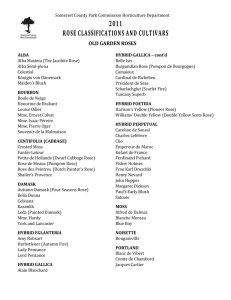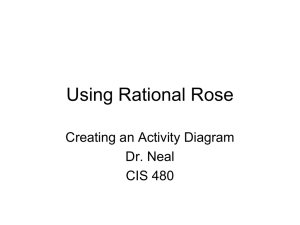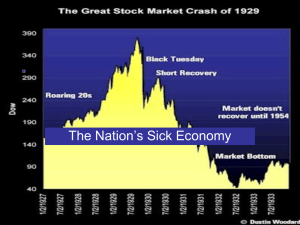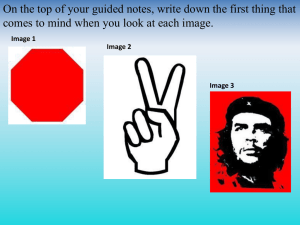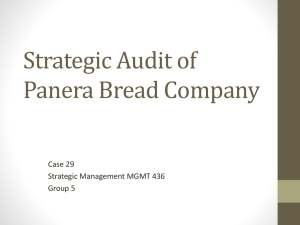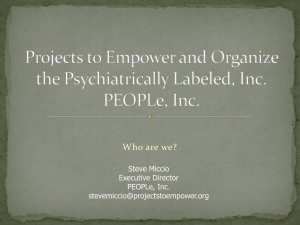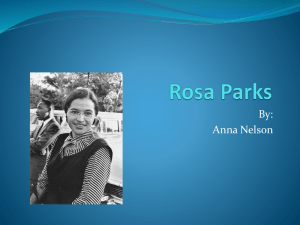Value-added Agriculture
advertisement
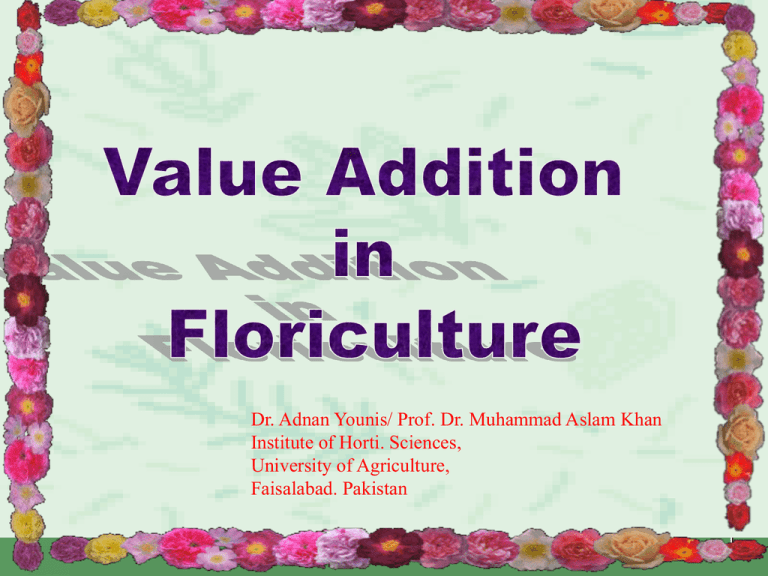
Dr. Adnan Younis/ Prof. Dr. Muhammad Aslam Khan Institute of Horti. Sciences, University of Agriculture, Faisalabad. Pakistan 1 Getting More for What You Already Have 2 What is value addition in Floriculture? Value added Floriculture is a process of increasing the economic value and consumer appeal of an floricultural commodity. Increasing the value and appeal of an floriculture product or commodity through changes in genetics, processing or diversification. Requires more time, labor and skill than typically seen in farming operations 3 For value-added products to be successful, it is recommended that Floricultural producers carefully identify goods that utilize local resources and that fulfill gap in the market. Adding value also adds cost to production, but careful planning and test marketing can significantly increase the net cash return of a small-scale Floricultural enterprise. 4 A Value-added marketing approach should be adopted to extend the spread of the market. Value-addition ensures high premium to the grower while providing more acceptable quality products for the domestic and export market. The value-addition for marketing flowers includes adoption of post-harvest technology and improved logistics 5 One of the most important aspects of marketing is to give your customers a reason to buy your products 6 Why use value addition in Floriculture? Unstable prices for raw commodities Federal farm policies Changing consumer preferences Make more money by cutting out the middleman 7 Concerns with value addition in Floriculture Marketing is critical If you can’t sell it, you won’t make money Legal and business restrictions can be complicating Do your homework before jumping off the deep end Consult the experts 8 9 10 11 12 13 14 15 Innovative catalogs 16 Areas of value-added Floriculture Essential oil extraction from flowers Cut flower production for occasions/Flower forcing Fresh Dried Live plants/Potted plants Foliage and other parts of plants Fresh Dried Potpourri 17 Essential oil Crops Rose Jasmine Tuberose Narcissus Murraya Marigold Calendula 18 19 World Production The yearly production of rose blossoms is 6,000 tons in Turkey 3,000 tons in Bulgaria and 1,000 tons in Morocco 800 tons are used for the production of dried buds, and the production of concrete oil tends to decrease. Total production of rose oil is around 2,000 kg a year, and total production of concrete oil is around 6,000 kg a year. The price of rose products is on an upward trend. Today, rose oil is above $5000/kg, while rose absolute is around $15000/kg. 20 The major producers of rose essential oil are Bulgaria, Turkey, Morocco, France, Iran, China, USA, Egypt, India and Italy The major consumers of rose essential oil are USA (40%), Western Europe (30%) and Japan (7%) Rest of World (23%) 21 Rose Products 1. Rose Petals (Fresh & Dry ) of Fragrant Species 2. Commercial Rose Based Products 3. Rose cut Flowers 22 Commercial Rose Based Products 1. 2. 3. 4. 5. 6. 7. 8. Rose Essential Oil Rose Based Perfume Sprays Rose Based Air Fresheners Rose Water Rose Jam (Gulqand) Rose Cream Rose Vaseline Rose Mouthwash 23 Rose Species Used for Essential Oil Extraction Rosa centifolia Rosa damascena Rosa bourboniana Gruss-an- Tepliz 24 Rosa centifolia 25 Rosa Gruss_an_Tepliz 26 Rosa damascena 27 Rosa bourboniana 28 Rosa species Rosa centifolia Rosa damascena Rosa bourboniana Gruss-an- Tepliz Flowering duration (days) No. of flowers/plant/ year 308 500-700 30-35 70 60 82 300 320 Methods Used for Oil Extraction: Solvent Extraction Method Steam Distillation Method SCF C02 Extraction Method 30 31 Steam Distillation 32 Yield of Essential Oil of Rosa Species Rosa sps. Flower used (Kg) Solvent extraction (g) SCF Extraction (g) Rosa centifolia 20 (20,000g) 3 4 Rosa damascena 20 (20,000g) 3.9 4.5 Rosa bourboniana 20 (20,000g) 1.9 2 Gruss-an- Tepliz 20 (20,000g) 1.2 1.8 33 Farmer Cooperative Example 34 Jasmine – Value Addition 35 Calendula – Value Addition 36 Marigold – Value Addition 37 Tube Rose 38 Murraya 39 Basil Oil 40 Mint Oil 41 Narcissus 42 Annual Profits Corresponding to Predominant Crops Grown in Pakistan 43 HIGH VALUE NON TRADITIONAL CROPS Crops International Price/kg Jasmine $9,350 Tuberose $7,450 Murraya $7,000 Narcissus $,8,600 Citrus $7,450 44 45



